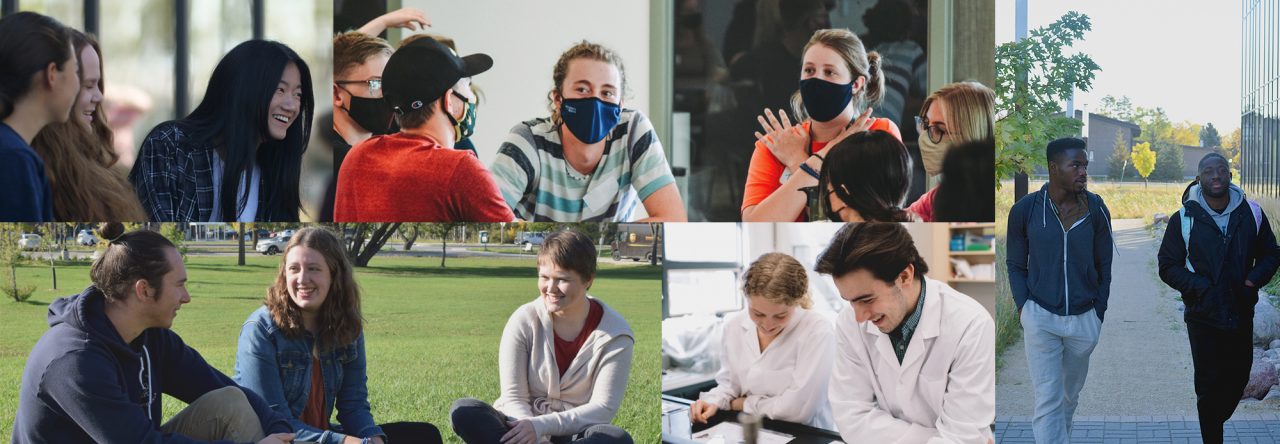This past summer I had the opportunity to do my practicum with the Department of Fisheries and Oceans Canada (DFO), at the Freshwater Institute in Winnipeg.
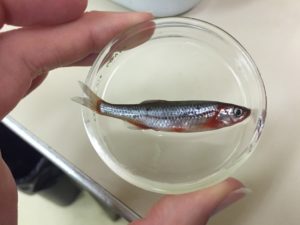 Over the course of the summer I learned so much and experienced what it would be like to be a research scientist. I began working with Rachel Krause, Assistant Professor of Biology at CMU, on a partnership project with DFO studying carmine shiners, a type of minnow, and the parasites found inside these fish. DFO wanted to continue this project over the summer and they hired me to conduct dissections.
Over the course of the summer I learned so much and experienced what it would be like to be a research scientist. I began working with Rachel Krause, Assistant Professor of Biology at CMU, on a partnership project with DFO studying carmine shiners, a type of minnow, and the parasites found inside these fish. DFO wanted to continue this project over the summer and they hired me to conduct dissections.
The field research brought me to Birch River, where the elusive carmine shiner can be found. This species is endangered, and this project is an effort to know more about the species and its changing metabolic rates related to temperature and climate change. In short, what we did was go out to the field (or river) and conducted respirometry experiments by placing the fish in tubes and measuring their oxygen consumption. These experiments are being done in the fall, spring, and summer, to measure metabolic rates related to temperature. In search of a relationship between metabolic rate and parasite load, the fish were then examined for parasites.
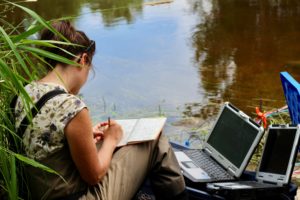 I also had the opportunity to go out and do nearshore surveys in the south basin of Lake Winnipeg, learn about fish tagging and receivers, and bathymetry. It was very cool to be working in a place where everything I learned in my CMU ecology classes was so relevant.
I also had the opportunity to go out and do nearshore surveys in the south basin of Lake Winnipeg, learn about fish tagging and receivers, and bathymetry. It was very cool to be working in a place where everything I learned in my CMU ecology classes was so relevant.
God was also brought into this summer in a weird variety of ways. I have always believed that whatever I do I am working for the Lord. Somedays in this job it felt so real.
There were times when I stood in the river for hours, as we were running experiments, and just got to stand in the middle of creation and admire it. I stared down the mud and what the small invertebrates crawl around. I watched tadpoles and small fish. I listened to the birds and the water flow by and enjoyed the sun. I took time to see all the life around us that we usually ignore. I remember one time just looking at one drop of water and seeing multiple things move within it.
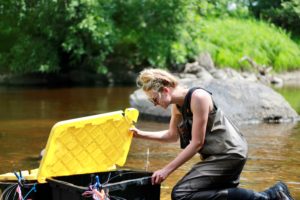 We are part of a world and a creation that is intricate and so much bigger than what we see. I never imagined myself dissecting fish, never-mind looking for parasites, but it was very fascinating. When you are studying something for a period of time under a microscope you see how intricate and amazingly created it is. Once you know more about something you want to care for it and protect it.
We are part of a world and a creation that is intricate and so much bigger than what we see. I never imagined myself dissecting fish, never-mind looking for parasites, but it was very fascinating. When you are studying something for a period of time under a microscope you see how intricate and amazingly created it is. Once you know more about something you want to care for it and protect it.
I also encountered God in the lab as I was faced with questions of life and death. It broke me to take these little fish that thrive so well in their natural environment and euthanize them so I could look for parasites. One surprising question that arose for me during my time at DFO was do I really have the right to experiment and in many cases take the life of different organisms to hopefully gain insight to help the rest of the species in the future. I found myself asking for forgiveness and apologizing as well as praying that each fish we killed would protect more of its kind in the future.
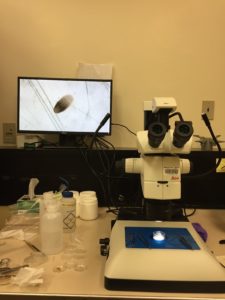 I also struggled a lot with working alone in the lab looking through a microscope for days. This work is not simple. Science is not easy and the questions we ask about the world around us are not easy to answer. I dissected fish all summer long and I still found new parasites. Somedays I needed to show up at work at 7:00 AM a few days in a row in and work long days in order to complete field work.
I also struggled a lot with working alone in the lab looking through a microscope for days. This work is not simple. Science is not easy and the questions we ask about the world around us are not easy to answer. I dissected fish all summer long and I still found new parasites. Somedays I needed to show up at work at 7:00 AM a few days in a row in and work long days in order to complete field work.
I also was pushed in the type of work I did in different environments. I love being outside but have never been an outdoorsy/back-woods type of person. Though, this job required me to work in a waist deep river in the cold rain seining for fish. It also required me to walk through the bush carrying heavy equipment needed for data collection. I learned that rain, bugs, mud, and sometimes sleep is not important in order to gather the information to the questions you are asking. I gained strength physically and mentally. And I know that God gave me strength to do this work.
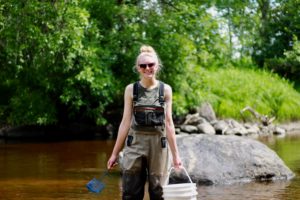 Another lesson I learned was that there is a lot of work that must be done to plan and prepare for going out into the field, and that once you are outdoors you are at mercy of the environment. As scientists we do not control the environment we go into and we must adapt and be creative in order to make our projects attainable in the field. I feel that I gained valuable skills of planning out a project and also being able to think on my feet when actually carrying out the experiment.
Another lesson I learned was that there is a lot of work that must be done to plan and prepare for going out into the field, and that once you are outdoors you are at mercy of the environment. As scientists we do not control the environment we go into and we must adapt and be creative in order to make our projects attainable in the field. I feel that I gained valuable skills of planning out a project and also being able to think on my feet when actually carrying out the experiment.
I have read so many journal articles for class and in those papers the emotions, the work, the failures, and frustrations are not shown. Science is objective but there has to be emotion in it. Why do we do things like protect these tiny fish that seem to have no known value to us?
Because we believe they are innately valuable and in my mind this value is given to them by God. He gave them life as he gave us life.
That is why I am so grateful for my faith and for this experience, because when I was in the river or at my microscope I could seek God’s Kingdom first.
Sara Wolowich is a 4th year Environmental Studies student.

